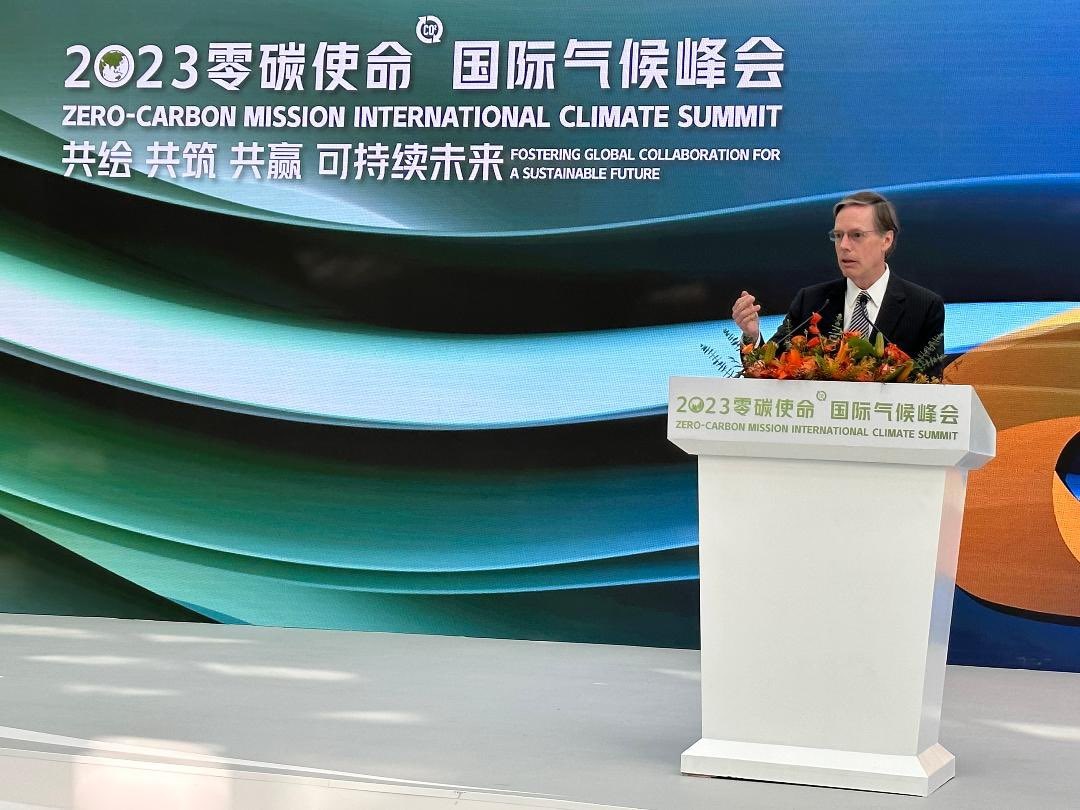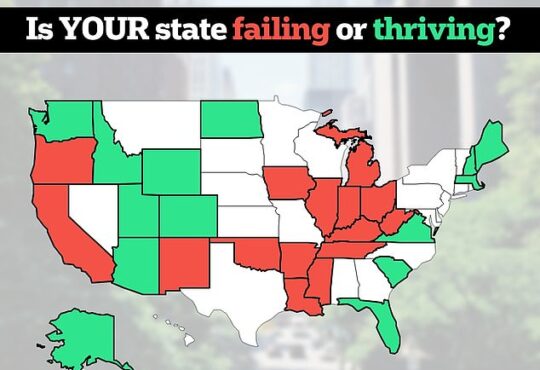

2023 Zero-Carbon Mission International Climate Summit, Opening Forum
2023零碳使命国际气候峰会
“Fostering Global Cooperation for a Sustainable Future”
“共绘 共筑 共赢 可持续未来”
Wednesday, November 1, 2023
2023年11月1日,周三
AS DELIVERED
已发表
Nicholas Burns (U.S. Ambassador to the PRC)
Good morning, everyone. It is a great pleasure for me to be with all of you this morning. I said to the [Chairman] coming in, this is an incredible building. This is my first time in this building, and I congratulate the architects and of course Phoenix TV. So, a beautiful setting for today’s meeting. It’s a real pleasure to be here.
I want to thank Phoenix TV, the World Wildlife Fund China – an organization I greatly respect – and the Rocky Mountain Institute in China for making this possible. I listened carefully to your speeches and applaud you for your commitment that you have made for all of us around the world to arrest the damage of climate change. It’s also a very great pleasure for me to be here with my friend Ambassador Al Hammadi from the United Arab Emirates. We are partners here. My friend and colleague Ambassador Jorge Toledo from the European Union.
We all have spoken together on previous climate change exchanges. We are working well together. I would say particularly the U.S. and the European Union have been working very closely together for a good 20 years on this problem. And we welcome the leadership of the United Arab Emirates for the Conference of the Parties that is coming up just at the end of this month. I look forward to the leadership of your government, Ambassador.
We’re all here today because there is no greater challenge for the world than the challenge of climate change. We know that because of historic droughts and historic flooding. And 2023 was the hottest summer on record globally. And we know that we have to do something about it together.
We know that the Intergovernmental Panel on Climate Change findings highlight that to limit the increase to 1.5 degrees Celsius, we need to accelerate dramatically the reduction in greenhouse gases, and we need to do this, this decade. We cannot wait for decades to come.
At the United Nations General Assembly just two months ago, our President Joe Biden said the following: He said the United States stands ready to work with China on issues where progress hinges on our common efforts. And nowhere is that more true and more critical than accelerating our efforts on the climate crisis.
Just this past July, my friend and my colleague John Kerry, our Special Presidential Envoy for Climate, was here in Beijing for three days meeting with his partner, [Special Envoy] Xie Zhenhua. That’s a remarkable partnership. They’ve been working together for years. They’re close partners. I think it symbolizes the fact that President Biden and President Xi Jinping have made climate change one of the most important areas for engagement between the United States and the People’s Republic of China. I know Secretary Kerry well. I served on his advisory board when he was Secretary of State. I know that he’s spoken to [Special Envoy] Xie close to 50 times. So, they talk by phone. They meet in person. They are working together. I know they feel the same in working with the European Union as well, because we are among the largest carbon emitters in the world. And I know they’ll continue, [Special Envoy] Xie and Secretary Kerry, this important work they have.
Last week we had the Governor of California here, Gavin Newsom. California is a very important state in our country. Our largest state by population. It is our largest state by GNP. It actually has the fifth largest GNP in the world, if you look at the state of California with countries. And it’s our leader on climate change. Governor Newsom spoke consistently throughout his visit about the fact that California is trying to create a low carbon, green economy of the future. I live all the way across the country, 3000 miles to the east in Massachusetts. Our state is also trying to create that kind of low carbon, green economy for the future. And when Governor Newsom met with President Xi Jinping, Vice President Han Zheng, Foreign Minister Wang Yi, with the [Party Secretary] of Beijing, and the Mayor of Shanghai, he made climate the first issue in all of those meetings.
And I think that is indicative, frankly, of where the American public is. Our public opinion polls show consistently that our public wants cleaner air, cleaner water, wants to see our government at all levels do something about climate change. And so, we feel confident that the United States, working with the UAE with the EU and other countries, can continue with that effort.
Speaking of the United States, President Biden has made a greater commitment through legislation, through appropriation of funds, to climate change than any other president in American history. You may have heard that Congress passed, with President Biden’s leadership, a $369 billion initiative, the Inflation Reduction Act. That’s the largest investment that the United States has ever made in clean energy and climate action. It is projected to deliver one billion tons of greenhouse gas reductions by 2030 — 10 times more climate impact than any other single piece of legislation in the history of the United States. We believe, because of these investments that we’re making in a green economy, [that] our Nationally Determined Contribution under the Paris Accords, of reducing our net greenhouse gas emissions of 50-52% by 2030, is realistic and is going to happen, and it will also enable us to reach net-zero emissions by 2050 or sooner.
Meanwhile, the United States is working with other countries because this is a global problem. I’m glad that we’re working, and proud that we’re working, with the European Union. We’re leading the Global Methane Pledge, a coalition of 150 countries launched at COP26 working to cut methane emissions by at least 30% from 2020 levels. We’re also working with Norway and other countries on the Green Shipping Challenge to put the maritime shipping sector on a pathway aligned with limiting the average global increase to 1.5 degrees Celsius. So, this is truly a global effort and I commend the organizers for framing it that way.
I have to say, however, and I say this very respectfully. The bottom line on climate, and the stark fact, is that because China is the world’s largest emitter of greenhouse gases, it will be impossible for the world to limit warming to 1.5 degrees Celsius without a stronger effort by China, without enhanced ambition by China. I say this very respectfully, because I am mindful of the enormous efforts that China has made in wind, in solar, and in clean energy. And we can all appreciate the fact that China has made that commitment. But China can help the world to success by peaking and starting to reduce emissions during this critical decade in which we live now.
China should follow through and build upon the U.S.-China mutual commitments in our Joint Glasgow [Declaration] almost two years ago, to phase down coal consumption, to develop an ambitious national methane action plan, and to address illegal deforestation. One of the most important steps that China can take is to cease building new unabated coal-fired power plants not already under construction. That would be in line with the commitment China has made to strictly control coal-fired power generation projects now and phase down coal consumption in this decade. China currently accounts for nearly 60% of the entire world’s pipeline of new coal-fired plants. And this proliferation of unabated coal, or coal used to produce energy without steps to eliminate emissions, threatens to negate any progress on climate change, as the recent momentum for the deployment of renewable energy sources indicates.
I would also note the critical importance of cutting non-CO2 greenhouse gases such as the super-pollutant methane. China is one of the very few countries in the world with a Paris target that does not address methane or other non-CO2 gases. Reducing all greenhouse gases beyond carbon dioxide alone is essential because non-CO2 greenhouse gases are responsible for half of today’s global warming.
So that’s the challenge. That’s the challenge for China. That’s the challenge for the United States. That’s the challenge for the European Union, for the Middle East, for countries all over the world. We are not currently on track to limit the average global increase to 1.5 degrees Celsius. And we must together put ourselves on that track, or else we face consequences of the type that we’ve all seen personally, in our various countries this summer with changing weather patterns.
I would also like to suggest in closing, this is not an issue just for the world’s leading two emitters: China and the United States of America. It’s for all major economies and it’s for all economies in the world. The window to limiting the world to 1.5 degrees Celsius is narrowing. And we must grasp the opportunity to keep that window open and to act with a greater sense of urgency now. This year, next year, this decade, not to wait to the next decade. In that spirit, I’d like to thank the organizers again, of this assembly this morning. I’m very pleased to be here and represent the United States. I look forward to the comments, I’m sure, of my colleague Ambassador Toledo and others. Thank you very much. Xiè xiè.






